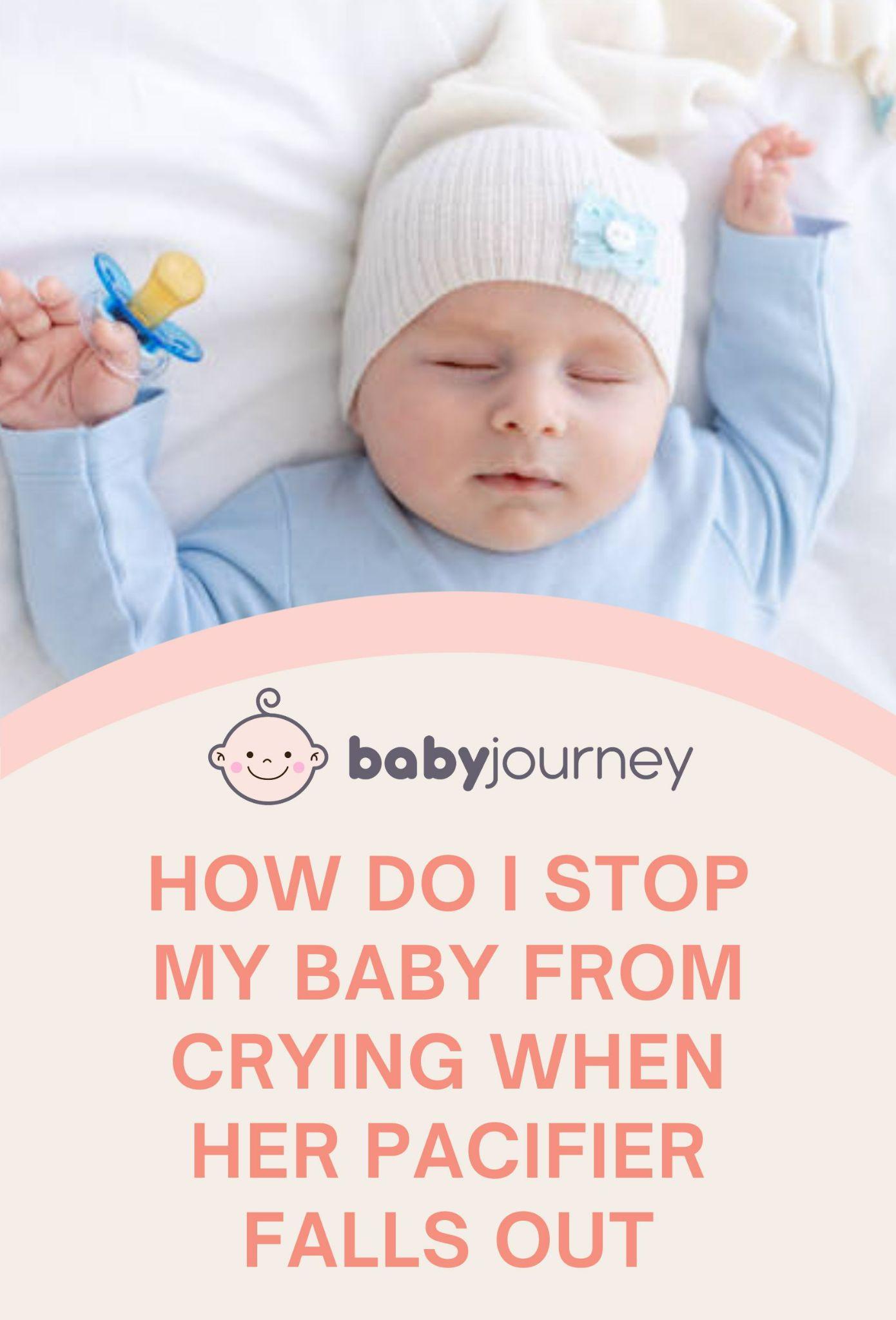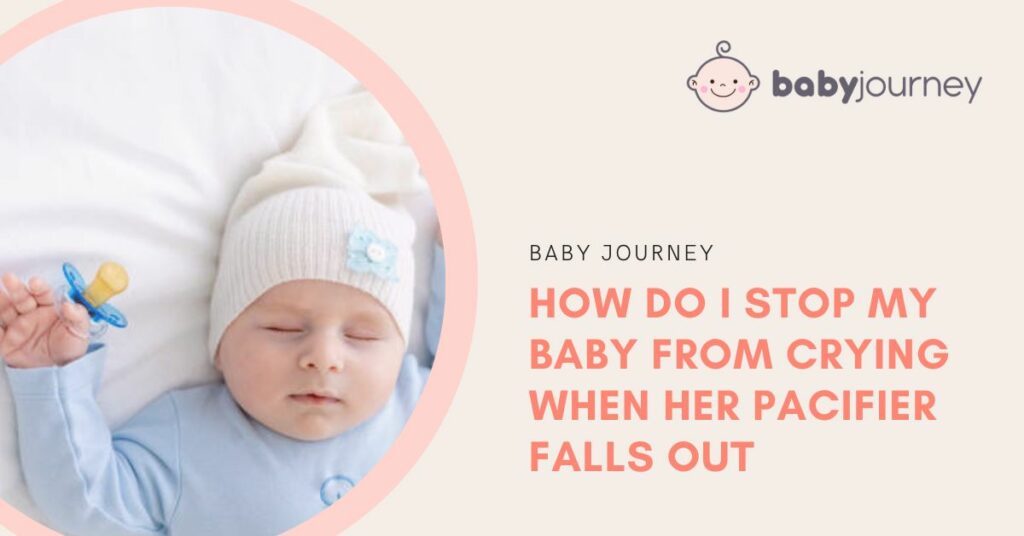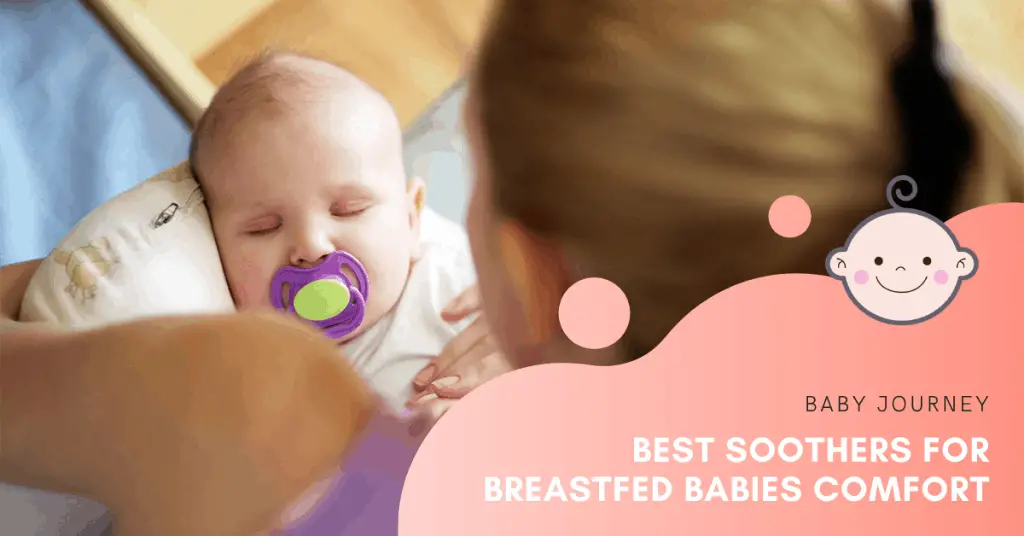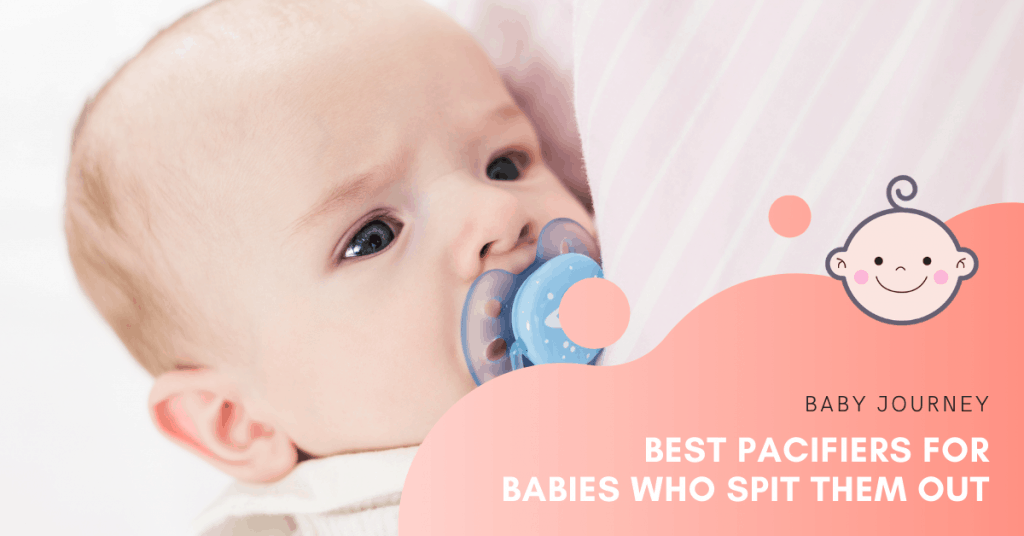Many parents have experienced the frustration on “How do i stop my baby from crying when her pacifier falls out?”. It can be a never-ending cycle that leaves both baby and parent exhausted. Fortunately, there are several solutions that can help keep the pacifier in place and prevent crying.
One solution is to use pacifier clips, which attach to the baby’s clothing and keep the pacifier within reach. Another option is to try different types of pacifiers, as some babies may prefer a specific shape or texture. It can also be helpful to gently pull the pacifier away from the baby’s mouth as they suck, which can encourage them to suck more intentionally and keep the pacifier in place.
Ultimately, it’s important to remember that pacifiers are just one tool for soothing a baby, and there may be other methods that work better for some babies. With patience and persistence, parents can find the right solution for their baby and help prevent crying when the pacifier falls out.
Understanding Pacifier Use
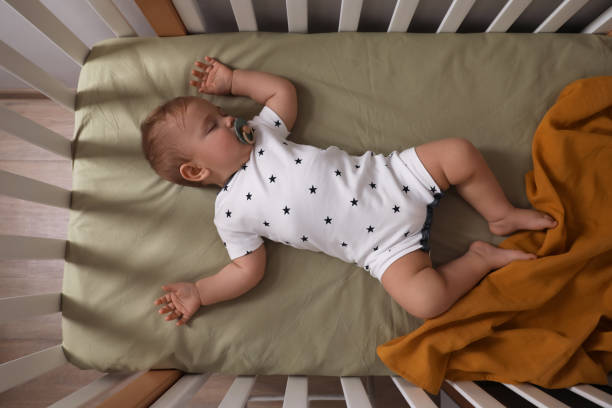
Pacifiers, also known as binkies, are a common soothing tool for babies. They provide comfort through non-nutritive sucking, which activates the sucking reflex and can help calm a fussy baby. Pacifiers are generally considered safe and can even reduce the risk of sudden infant death syndrome (SIDS) when used during sleep [1].
However, pacifiers can also become a sleep prop, meaning that a baby becomes dependent on it to fall asleep or to stay deep sleep. When a pacifier falls out of a baby’s mouth during sleep, it can cause the baby to wake up and cry. This can be frustrating for parents, especially if it happens multiple times throughout the good night’s sleep.
It is important to note that pacifier use should be limited to sleep times and should not be used as a substitute for feeding. Overuse of pacifiers can lead to dental problems, such as misaligned teeth or bite problems [2].
When a baby becomes dependent on a pacifier to falling asleep, it can be difficult to wean them off of it. However, it is important to do so in order to prevent future sleep disruptions. There are several strategies that parents can use to help their baby learn to sleep without a pacifier, such as gradually reducing pacifier use or implementing a gentle sleep training method [3].
Overall, pacifiers can be a useful tool for soothing babies, but it is important to use them appropriately and to wean babies off of them when necessary.
Why Babies Cry When Pacifier Falls Out
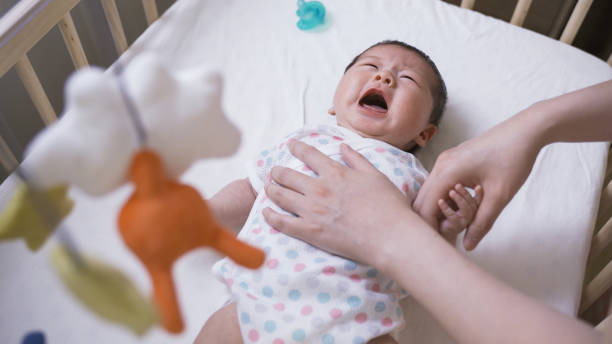
When a baby’s pacifier falls out, it can be a distressing experience for both the baby and the parents. Babies cry when their pacifier falls out because it is their way of expressing discomfort or distress. They may feel uncomfortable or stressed without their pacifier, which can lead to fussiness and crying.
Babies rely on their pacifiers to provide them with comfort and security. The sucking motion helps to soothe them and calm them down, which is why they often fall asleep with their pacifiers in their mouths. When the pacifier falls out, they lose that sense of comfort and security, which can cause them to cry and become fussy.
It is important to note that crying is a normal part of a baby’s development. It is their way of communicating their needs and wants. When a baby cries, it is important to try and identify the cause of the crying and provide comfort and reassurance.
Parents can help their babies feel more comfortable without their pacifier by providing other forms of comfort, such as holding them, rocking them, or singing to them. It may also be helpful to try and identify any underlying causes of stress or discomfort, such as hunger or a dirty diaper, and address those needs.
In summary, babies cry when their pacifier falls out because they rely on it for comfort and security. Parents can help their babies feel more comfortable by providing other forms of comfort and addressing any underlying needs or stressors.
Sleep and Pacifier Use
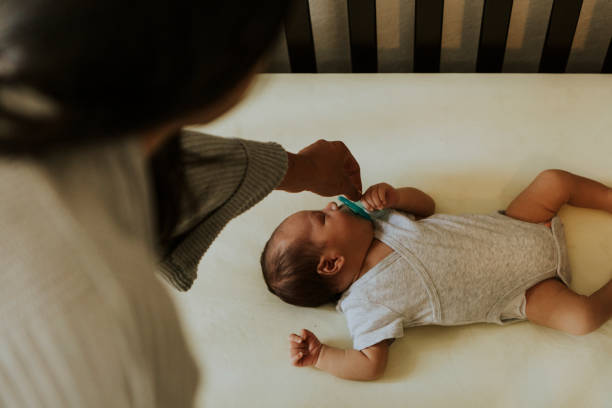
Pacifiers can be a helpful tool for soothing a fussy baby and helping them fall asleep. However, many parents find themselves in a frustrating sleep cycle of waking up throughout the night to replace a pacifier that has fallen out of their baby’s mouth.
While pacifiers can be a helpful sleep aid for babies, they can also become a sleep prop. This means that the baby has pacifier habit to falling asleep and may wake up frequently throughout the night when it falls out of their mouth.
Sleep cycles training can be an effective way to help a baby learn to fall into deep sleep without a pacifier. This involves gradually reducing the amount of time the baby spends using a pacifier and helping them learn to self-soothe and fall asleep on their own.
It is important to note that bedtime routine training can be a difficult and emotional process for both the baby and the parents. It is important to approach sleep training with patience, consistency, and a willingness to adapt to the baby’s individual needs.
Parents should also be mindful of safe pacifier use. Pacifiers should be replaced regularly, and should never be tied or clipped to a baby’s clothing or bedding. One-piece pacifiers are recommended, as they reduce the risk of choking hazards. Pacifiers with air holes in the shield are also recommended, as they allow for proper air flow.
In summary, pacifiers can be a helpful sleep aid for babies, but they can also become a sleep prop. Sleep training can be an effective way to help a baby learn to fall asleep without a pacifier, but it is important to approach this process with patience and consistency. Safe pacifier use is also important to ensure the baby’s safety during sleep.
Feeding and Pacifier Use
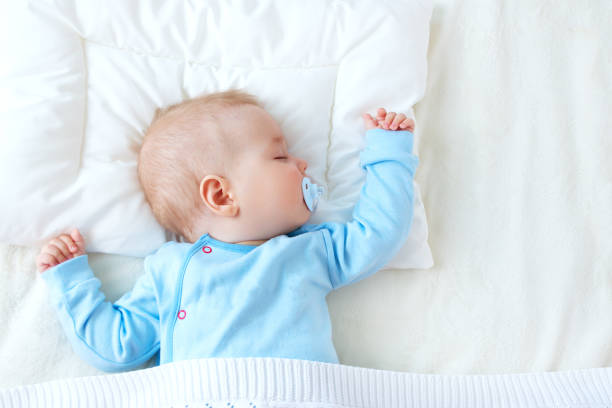
Feeding and pacifier use are two of the most important ways to soothe a crying baby. Hunger is one of the most common reasons why babies cry, so it’s important to make sure that your baby is well-fed before using a pacifier to calm them down.
Breastfeeding is a great way to ensure that your baby is getting the nutrition they need. Breast milk contains all the nutrients that a baby needs, and it’s also easier to digest than formula. If your baby is crying because they’re hungry, try feeding them before using a pacifier.
If you’re not breastfeeding, make sure that your baby is getting enough formula. Follow the instructions on the formula container to make sure that you’re giving your baby the right amount. It’s also important to make sure that the formula is at the right temperature, as this can affect how well your baby drinks it.
Once your baby is well-fed, you can use a pacifier to help soothe them. Pacifiers can be a great way to calm a fussy baby, but it’s important to use them correctly. Here are some tips for using pacifiers:
- Choose the right size: Pacifiers come in different sizes, so make sure that you’re using the right size for your baby’s age.
- Clean them regularly: Pacifiers can harbor bacteria, so make sure that you’re cleaning them regularly. Boil them in water for a few minutes or use a pacifier sterilizer.
- Don’t force them: If your baby doesn’t want to take a pacifier, don’t force them. Some babies just don’t like them.
- Use them in moderation: While pacifiers can be a great way to soothe a crying baby, it’s important not to rely on them too much. Having pacifier habit can lead to dental problems and can also interfere with breastfeeding.
By making sure that your baby is well-fed and using a pacifier correctly, you can help soothe a crying baby and make life a little easier for both you and your baby.
Soothing a Crying Baby
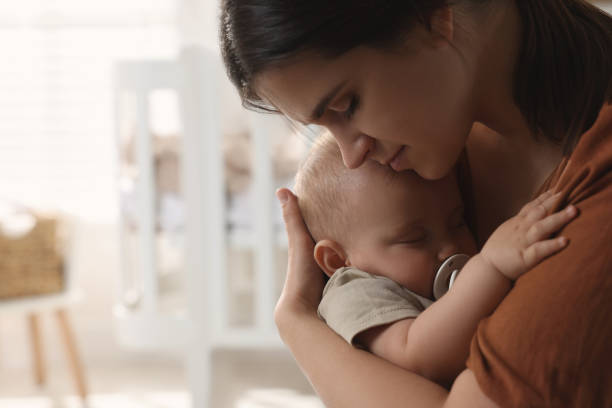
When a baby starts crying, it can be difficult to know what to do. One of the most common reasons for a crying baby is when their pacifier falls out. Here are some tips for soothing a crying baby when their pacifier falls out.
Rocking or Holding
One of the easiest ways to soothe a crying baby is to rock them or hold them. This can help calm them down and make them feel secure. Some babies prefer to be rocked back and forth, while others prefer to be held close to the chest. Experiment with different positions to see what works best for your baby.
Distraction
Sometimes, distracting a baby can help stop them from crying. Try playing some music or singing a song. You can also try making funny faces or playing with a toy. The key is to find something that will capture their attention and take their mind off their pacifier.
Comfort
Comforting a baby can also help stop them from crying. This can involve giving them a warm blanket or a small stuffed animal, to hold. You can also try gently rubbing their back or patting their bottom. The goal is to make them feel safe and secure.
In conclusion, there are several ways to soothe a crying baby when their pacifier falls out. Rocking or holding them, distracting them, and providing comfort are all effective strategies. Remember to be patient and try different techniques until you find what works best for your baby.
Pacifier Safety and Hygiene
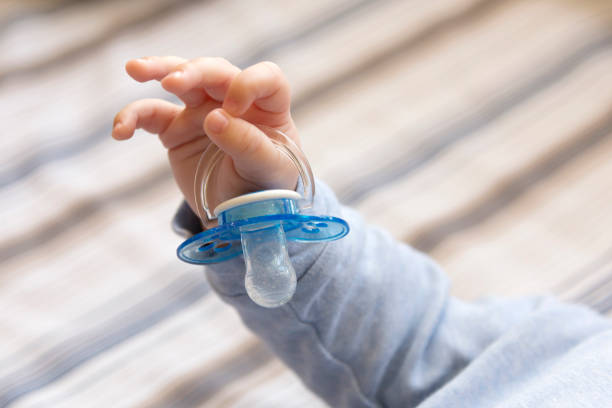
When it comes to using pacifiers for newborn babies however, safety and hygiene are essential factors to consider. Here are some safety tips to keep in mind:
- Always choose a pacifier that is appropriate for the baby’s age and size. A pacifier that is too small can pose a choking hazard, while a pacifier that is too big can cause discomfort and may not stay in place.
- Check the pacifier regularly for signs of wear and tear, such as cracks or holes. Discard any damaged pacifiers immediately, as they can break apart and pose a choking hazard.
- Never tie a pacifier to a baby’s crib or around their neck or hand. This can be very dangerous and increase the risk of Sudden Infant Death Syndrome (SIDS).
- In order to prevent the newborn from putting the entire pacifier into their mouth, the shield between the nipple and the ring should be at least 1-12 inches (3.8 cm) wide. The shield should also be constructed of sturdy plastic and have ventilation holes.
- Always clean the pacifier before each use, using warm water and mild soap. Rinse it thoroughly and let it air dry. Avoid using harsh chemicals or antibacterial soaps, as they can be harmful to the baby.
- If the pacifier falls on the floor or any other surface, wash it immediately before giving it back to the baby. Germs can spread quickly, and a dirty pacifier can increase the risk of illness.
By following these safety tips, parents can ensure that their baby’s pacifier is safe and hygienic, reducing the risk of choking, SIDS, and illness.
Pacifier Weaning Strategies
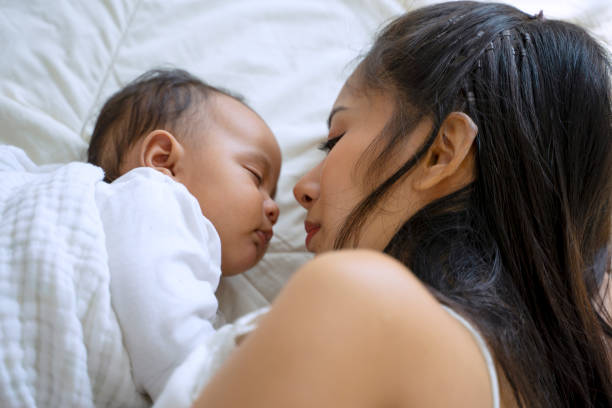
When it comes to weaning a baby off a pacifier, there is no one-size-fits-all approach. However, there are some strategies that parents can try to help their baby self-soothe without a pacifier.
Gradual Weaning
One strategy that parents can use is gradual weaning. This involves slowly reducing the amount of time the baby spends with the pacifier until they no longer need it. Parents can start by only offering the baby sleep pacifier during nap time and bedtime, and gradually reducing the amount of time the baby has it in their mouth.
Distraction
Another strategy is to distract the baby when they start to cry after the pacifier falls out their own mouth. Parents can try to engage the baby in play or offer them a toy to distract them from the fact that they do not have their pacifier.
Positive Reinforcement
Positive reinforcement can also be an effective strategy for weaning a baby off a pacifier. Parents can offer praise or a small reward when the baby goes without the pacifier for a certain amount of time. This can help the baby associate not having the pacifier with positive experiences.
Cold Turkey
Some parents may choose to get rid of the pacifier through cold turkey. This involves taking the pacifier away completely and not offering it again. This approach can be difficult for both the baby and the parents, but it can be effective for some babies.
Self-Soothing Techniques
Finally, parents can try to teach their baby self-soothing techniques that do not involve a pacifier. This can include swaddling, rocking, or singing to the baby. By teaching the baby to self-soothe, they can learn to fall asleep and stay asleep without the need for a pacifier.
Overall, weaning a baby off a pacifier can be a challenging process, but with patience, persistence, and a variety of strategies, parents can help their baby learn to self-soothe without a pacifier.
Pacifier Replacement and Accessories
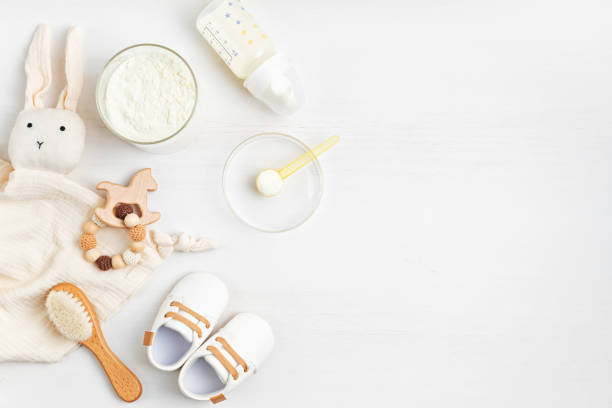
When a baby cries because their pacifier falls out, one solution is to replace the pacifier. Having a few pacifiers on hand can be helpful, especially if the baby is prone to dropping them frequently. It is essential to choose a pacifier that is appropriate for the baby’s age and developmental stage.
When selecting a pacifier, parents should look for a model that is easy to clean and made of safe materials. Some pacifiers have a one-piece design, which eliminates the risk of small parts coming loose and posing a choking hazard. Other models have a shield that prevents the pacifier from going too far into the baby’s mouth.
Another accessory that can be useful is a pacifier clip. These clips attach to the baby’s clothing and keep the pacifier within reach. This way, if the pacifier falls out of the baby’s mouth, it won’t fall to the ground and become dirty. Pacifier clips come in a variety of styles and materials, so parents can choose one that matches their baby’s clothes or personality.
It is important to note that pacifier clips should be used with caution. They should never be attached to a baby’s crib or other sleeping surface, as this can pose a strangulation hazard. Additionally, parents should regularly inspect the rid of the pacifier clip for signs of wear and tear and replace it if necessary.
By having a few pacifiers on hand and using a pacifier clip, parents can help prevent their baby from crying when their pacifier falls out. It is essential to choose safe and appropriate pacifier game accessories and always supervise the baby when they are using a pacifier.
Addressing Dental Concerns
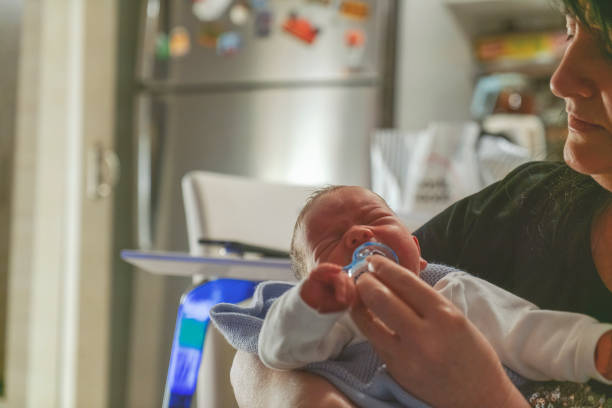
While pacifiers can be a helpful tool for soothing a fussy baby, they can also have potential dental consequences. Long-term pacifier use can cause dental issues such crowded or misaligned teeth, bite issues, tongue protrusion, alterations to the mouth’s roof, and changes in the placement of teeth. In extreme circumstances, using pacifiers may even make future braces use necessary.
However, it is important to note that not all babies who use pacifiers will experience dental problems. The risk of dental issues depends on the frequency, duration, and intensity of pacifier use. Babies who use pacifiers for short periods and only during sleep may be less likely to experience dental problems than those who use pacifiers for longer periods sleep time and throughout the day.
To minimize the risk of dental problems, parents can take the following steps:
- Limit pacifier use: Try to restrict pacifier use to naptime and bedtime. Avoid using pacifiers as a way to calm a fussy baby during the day.
- Choose the right pacifier: Look for pacifiers that are the appropriate size for your baby’s age and that have a symmetrical shape. Avoid pacifiers with a bulbous or angled shape, as these can cause dental problems.
- Monitor pacifier use: Keep an eye on your baby’s pacifier use and remove the pacifier from your baby’s mouth once they fall asleep.
- Encourage self-soothing: As your baby gets older, encourage self-soothing techniques such as thumb-sucking or using a lovey instead of relying on a pacifier.
- Regular dental check-ups: Schedule regular dental check-ups for your baby to monitor their dental health and catch any potential problems early.
By taking these steps, parents can help minimize the risk of dental problems associated with pacifier use and promote healthy dental development in their babies.
Parenting Advice and Suggestions
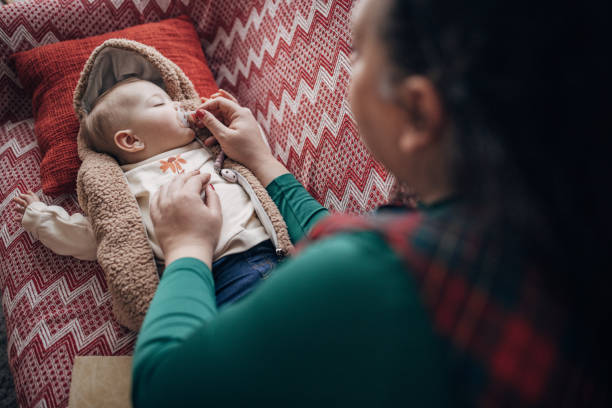
When a baby’s pacifier falls out, the baby cry and it can be distressing for both the baby and the parents. Here are some parenting advice and suggestions to help soothe a crying baby when her pacifier falls out.
Offer Comfort and Reassurance
When a baby’s pacifier falls out, the first thing parents should do is offer comfort and reassurance. They can pick up the baby, hold her close, and speak in a soothing voice. This will help the baby feel safe and secure, and may help her back to sleep or calm her down.
Try Different Soothing Techniques
If the baby continues to cry, parents can try different soothing techniques. For example, they can try rocking the baby gently, singing a lullaby, or playing soft music. They can also try giving the baby a warm bath or a gentle massage to help her relax.
Check for Hunger or Discomfort
Sometimes, a baby may cry when her pacifier falls out because she is hungry or uncomfortable. Parents can check to see if the baby needs to be fed or if her diaper needs to be changed. They can also check to see if the baby is too hot or too cold, and adjust the temperature accordingly.
Use a Pacifier Clip
To prevent the child the pacifier from falling out in the first place, parents can use a pacifier clip. This will keep the pacifier securely in place, and prevent it from getting lost or dirty.
Stay Calm and Patient
Finally, it’s important for parents to stay calm and patient when their baby is crying. This can be a stressful and challenging time, but it’s important to remember that babies cry for a variety of reasons. By offering comfort and reassurance, trying different soothing techniques, and checking for hunger or discomfort, parents can help their baby feel calm and secure.
Conclusion
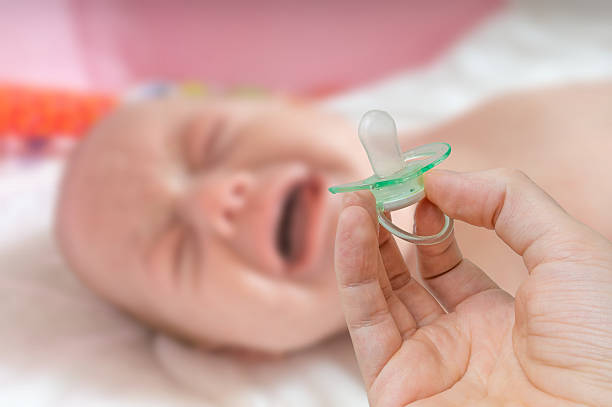
In conclusion, dealing with a crying baby when their pacifier falls out can be a frustrating experience for any parent. However, there are several strategies that can be implemented to help soothe the baby and prevent excessive crying.
One effective strategy is to ensure that the pacifier is securely in place before the baby wakes or night time Parents can also try using pacifiers with a built-in strap that can be attached to the baby’s clothing to prevent the pacifier from falling out.
Another strategy is to gradually wean the baby off the pacifier, especially if the baby is older than six- months of age. This can be done by gradually reducing the pacifier usage and replacing it with other soothing techniques, such as singing lullabies or stuffed animals.
It is important to note that pacifiers should not be used as a substitute for positive sleep associations, such as establishing a consistent sleep routine and creating a calm sleep environment. Additionally, parents should always follow the recommended safety guidelines when using pacifiers, such as ensuring that the pacifier is clean and free of any defects.
Overall, with patience and persistence, parents can help their baby overcome their pacifier dependence and minimize crying episodes when the pacifier falls out.
